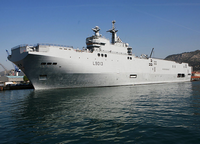TBILISI, Georgia -- Despite disagreeing over whether France should sell four Mistral-classamphibious vessels to Russia, most Western defense analysts seem tobelieve that the deal will not only happen, but is an item of overblownconcern. However, prevailing opinion in Washington and Brussels standsin sharp contrast to Eastern European capitals, where unease over thesale remains strong and is rooted in very different assumptions overMoscow's intentions.
Many in the West simply do not believethe vessels would significantly alter the balance of power in theregion, pointing to the relatively minor combat capability they wouldadd compared to existing capabilities in Russia's fleet. Proponents andthose indifferent to the deal have also used the poor overall conditionof the Russian fleet as well as the worldwide upswing in the acquisition of similar amphibious platforms to relativize Russia'sintentions. While technically correct, such observations gloss oversome key issues that lie at the heart of Eastern European fears.
Certainly,there is no question that the Russian navy has qualitatively declinedsince the demise of the Soviet Union. And to be sure, even thecomparatively advanced Mistrals do little to address the imminentshortfall in Russian surface warfare assets, such as cruisers,destroyers, frigates and corvettes. From this perspective, the Mistraldoes little to shift the balance of power.

